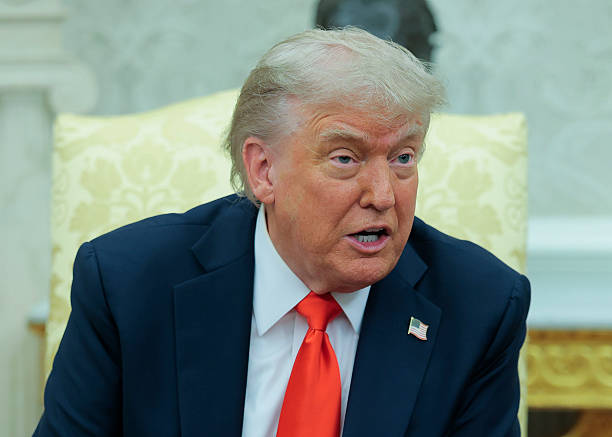Senate Passes Trump’s Massive Tax Cuts and Spending Bill in Tie-Break Vote
The Senate narrowly passed President Trump's massive tax cuts and spending bill in a 50-50 vote broken by Vice President JD Vance, setting the stage for final House approval.
 President Trump Hosts German Chancellor Merz At The White House
President Trump Hosts German Chancellor Merz At The White HouseSenate Republicans pushed President Donald Trump’s sweeping tax breaks and spending cuts bill to passage Tuesday by the slimmest possible margin, ending a tense overnight session with a 50-50 tie broken by Vice President JD Vance. The bill now returns to the House for final approval before Trump’s self-imposed July Fourth deadline.
Three Republican senators — Thom Tillis of North Carolina, Susan Collins of Maine, and Rand Paul of Kentucky — joined all Democrats in voting against the legislation, highlighting divisions within the GOP over key provisions, especially deep cuts to Medicaid and food stamps.
“In the end we got the job done,” said Senate Majority Leader John Thune of South Dakota, who spent the weekend negotiating behind closed doors to secure support from wavering Republicans.
The 887-page “One Big Beautiful Bill Act,” stripped of its formal name after a Democratic amendment, combines \$4.5 trillion in tax cuts with \$1.2 trillion in spending reductions. It makes permanent Trump’s 2017 tax rates, introduces new breaks such as no taxes on tips, and rolls back billions in green energy credits. The bill also includes a \$350 billion border and national security package and imposes stricter work requirements for Medicaid and food stamps.
Amid marathon amendment votes and increasing pressure, Republican leaders were forced to strike late-night deals. Murkowski of Alaska secured temporary relief for food stamp cuts in her state but failed to boost Medicaid reimbursements. She voted yes, while Collins, despite inserting a \$50 billion rural hospital fund into the final version, voted no, citing broader objections.
The nonpartisan Congressional Budget Office (CBO) projected the bill would add \$3.3 trillion to the deficit over ten years and result in 11.8 million more uninsured Americans by 2034. Senate Democrats, led by Chuck Schumer, condemned the legislation, calling it deeply unpopular and fiscally irresponsible.
Billionaire Elon Musk intensified opposition from outside the Senate, denouncing the bill as a financial disaster and vowing to campaign against supportive lawmakers. Meanwhile, Trump targeted Republican dissenters, with Tillis announcing he would not seek reelection.
Speaker Mike Johnson plans a Wednesday vote in the House, despite concerns over Senate modifications, especially to Medicaid. House leaders vowed to deliver the bill to Trump by Friday.
Sen. Patty Murray of Washington criticized the GOP’s fiscal approach, particularly its decision to treat Trump’s 2017 tax breaks as “current policy,” excluding their cost from deficit calculations. “Magic math,” she said, “won’t fly with Americans trying to balance their own household books.”
The bill’s passage marks a pivotal moment for Trump and Republicans, who have poured their political capital into delivering on the president’s top legislative priority before the November election.



.jpg)



Conversation